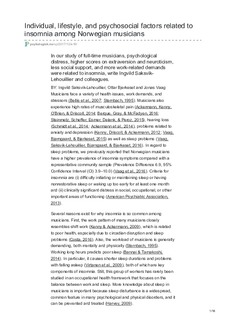Individual, lifestyle, and psychosocial factors related to insomnia among Norwegian musicians
Journal article, Peer reviewed
Published version
Permanent lenke
http://hdl.handle.net/11250/2475803Utgivelsesdato
2017Metadata
Vis full innførselSamlinger
- Institutt for psykisk helse [1301]
- Institutt for psykologi [3103]
- Publikasjoner fra CRIStin - NTNU [38127]
Sammendrag
Musicians report a considerably higher prevalence of insomnia symptoms compared to community samples in the general workforce. The aim of this study was to investigate the association between insomnia and health, work-related, and lifestyle factors among musicians. A total of 645 full-time musicians completed a questionnaire measuring insomnia symptoms: personality, psychosocial factors (perceived job demands, job control, effort-reward imbalance, and general social support), and lifestyle (smoking, marijuana use, alcohol use, and physical activity). Multiple regression analysis showed that higher scores on neuroticism and extraversion and on perception of greater work demands were positively related to insomnia symptoms. In contrast, the experience of social support was negatively related to insomnia symptoms in the final model. In sum, neuroticism was the single strongest variable associated with insomnia. Extraversion, however, also seemed to add something unique to the explanation of insomnia among full-time musicians when controlling for work environment variables. Moreover, demands and social support may be more important for musicians’ sleep than control and effort-reward imbalance. Given that our study is cross-sectional, longitudinal studies are still needed to clarify the causal relationships among personal, psychosocial, and lifestyle variables and insomnia.
